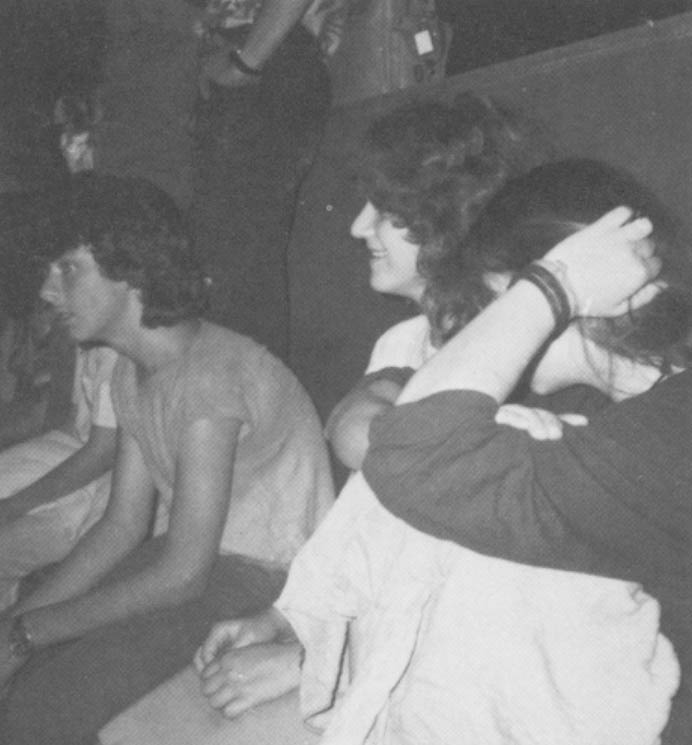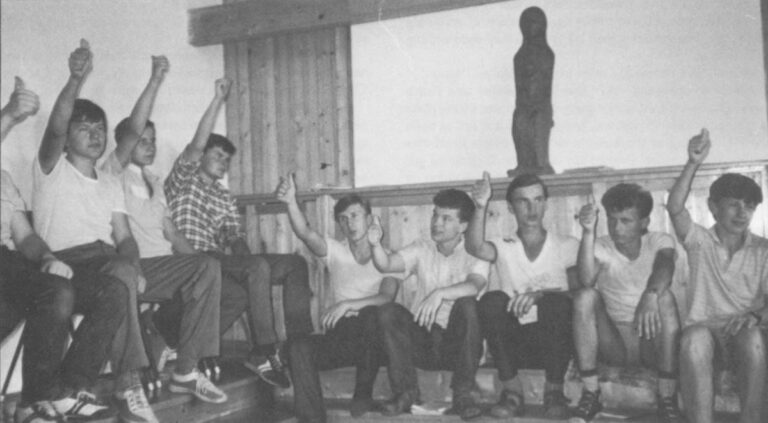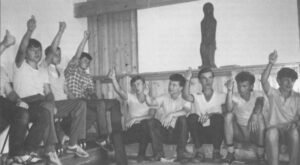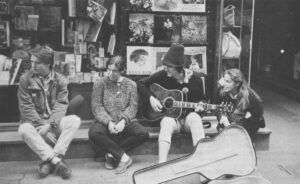WARSAW–When Danuta Pawlik got engaged, she thought her worries were over, but in fact that was when they began. Up until then, she had been a cheerful 22-year-old, just finished school, fitted out with a diploma in foreign languages for business use, and full of big dreams about the future. Not too big, of course, for after all this was martial law Poland, and there were limitations. But she envisioned a decent job at a good salary with the Polish airline or travel agency for herself; her boyfriend, Michal, was going to have a wonderful job with the technical crew of a popular Polish rock band. They would marry, have an exciting life (by Polish standards), travel, and Michal would make “masses of money,” Danuta declared. Best of all, the frustrations of the present would disappear. There would be no more long nights walking the streets of Warsaw and embracing in the parks until two or three in the morning because everything was closed, they had no car, and they couldn’t go home to one of their tiny apartments, where they would be forced to sit under their parents’ noses. When they were married, everything would be fine.
Not long after the marriage plans were announced, however, a niggling concern began to poke fretfully into everyone’s thoughts. Where, it was whispered with a tinge of anxiety, Danuta and Michael (not their real names) live? In Communist Poland in the 1980s, a young couple starting out in life could not hope to have an apartment of its own. After a brief boom in the ’70s, housing construction had sputtered and slowed as the economy stalled and spiraled downward. The population, meanwhile, swelled. An already burdensome 10 to 15-year waiting period for flats had stretched to 25. Unless someone were wealthy enough to rent a privately-owned apartment at exorbitant rates, or to buy one for millions of zlotys or thousands of U.S. dollars, the only alternative was to squeeze in with relatives.
The Pawliks held their breath at the prospect of Michal’s joining them and their two daughters in their cramped three room home in a shabby high-rise apartment building. Michal, for his part, knew he couldn’t bring his bride to live in the even smaller two-room flat he shared with his mother and grandmother.
Danuta schemed sanguinely of other solutions. Her paternal grandmother lived alone in a fairly large old two-room apartment. Surely she could spare one room. But that lady had shared her home for more than 30 years with a variety of strangers and family. Now in her 70s and alone at last, she delicately let it be known she wished to live out her life in peace and privacy. Hurt but hiding it, Danuta turned to Michal’s father. Divorced and remarried, he lived in a small house on the outskirts of Warsaw with a couple of small rooms on the second floor that could make a workable apartment. But these, it turned out, had to be kept free for the new wife’s 17-year-old daughter, who could be getting married herself in just a few years.
After the wedding, Michal moved into Danuta’s room at her house. The Pawliks gritted their teeth and welcomed him. Danuta threw away her stuffed animals, tore down her girlhood posters, repapered and tried to imagine she was in a brand-new place, instead of the room she had spent her life in and had no prospect of leaving. She worked a few months with the Polish airline for a paltry 8,000 zlotys ($50) a month, then became pregnant on a belated honeymoon trip to the Baltic shore. Forced to lie in bed for most of the pregnancy because an incompetent gynecologist had mangled the neck of her uterus, she drew a maternity pension of 4,000 zlotys ($25 a month).
Michal’s job with the rock group, meanwhile, turned out to be seasonal and erratic. The money didn’t flow in in torrents. When he was gone it was for weeks at a time; when he was home, it was for months, and he fought with Danuta’s mother and railed at the discomfort of close quarters where everyone shared the bathroom and kitchen and the only place to hide in was a 6×10-foot room with a single bed and a crib. He took to extending his trips, telling Danuta he would be home on a given date and showing up two or three days later, with no explanation.
Once the baby was born, Danuta spent her days making the endless rounds of the shops, standing in line for meat and milk, then rushing home to cook the baby’s food, jousting with her mother over space in the kitchen. In the long, dull evenings, her parents would pressure her to urge Michal to get a more regular job, to “buckle down to life” and shoulder his responsibilities as husband and father until, sometimes, she felt like bursting into tears. “Why should he slave away for 40 years at some dull job like you have?” she would shout. “What do you have to show for your hard work? What does anyone have to show for it in this rotten country?”
In barely two years, Danuta has been transformed. The energetic, resourceful girl has been replaced by a tired, melancholy woman who ponders her options for the future with far a greater realism than she exercised before. Her dreams have shrunk while her sense of injustice has grown.
“My biggest fear is that I’ll end up having the kind of life my parents have had,” she confided one summer evening in Warsaw. For a few rare hours, she had the apartment to herself; her parents and younger sister were out, Michal was on a road trip, the baby was asleep. She was delighted that I had brought wine, bought in a dollar store, and fetched her best glasses, carefully wrapped in tissue paper, from her room. “My parents have never been anywhere, never seen anything, never done anything exciting. Not because they didn’t want to, but because there weren’t any means or opportunity.
“But I know that people live better than this elsewhere. I know there’s a world where you don’t have to stand in line to buy the simplest things, where there are fun things to do and places to go, where everything isn’t gray–gray houses, gray streets, gray trees, gray grass, gray people. Those are the words of a song, did you know, by a new group called ‘Tilt’. They’ve hit the nail on the head.” To this drabness, Danuta herself had not yet given in; she wore a bright orange T-shirt and matching trousers, requested from relatives in the West because “if I don’t have color I’ll die.” Every day for a week, I would see her in the same outfit.
“Worst of all,” she said, twirling her wine glass in her fingers. “I’m terrified I’ll have to spend my youth, my best years, crowded into this hole.” She gazed forlornly about the room, then confided that Michal’s father had purchased his parents’ apartment and promised Michal that when the old people passed away, it would be his. “So what do you think,” Danuta said with a bitter laugh. “I’m sitting around hoping two nice old people will hurry up and die. That’s what you come to.”
“Sometimes I get in such a down, it’s just a total,” she said, using peculiar Polish slang that turns the English words “down” and “total” into nouns. “This housing thing is just a symptom of what’s wrong with this country. The truth is, there’s no hope, no hope at all. It scares me to death, but what I think is”–she stared into her glass–”we’ll give it a year or two, until the baby’s bigger, and if it’s no better, we’ll get the hell out. Of course,” she added slowly and with perfect seriousness, “none of it may matter by then. You see, I really believe we’re heading for a holocaust, that this is all going to come to a crashing end.”
Listening to Danuta speak, you might be hearing the thoughts of a whole generation of young Poles. The feelings that poured from her, unsolicited and unprompted, in her parents’ bleak living room, are shared by most of her contemporaries in what Polish sociologists and historians have already dubbed the “post-Solidarity generation.” Her slide from optimism to gloom is typical of those who, as teenagers, saw the trade union movement Solidarity sweep the country with hopes that were rudely dashed on the shoals of a military crackdown. Raised during Poland’s era of prosperity in the mid-70s, when the regime of then-general secretary Edward Gierek took out massive Western loans, loaded the country with consumer goods and flung wide the doors for travel and communication with the West, these youngsters grew up with great expectations and broad awareness of the difference between life in their socialist homeland and that in the capitalist West. Danuta’s odyssey of frustration was no fluke, and no isolated case, but coincided with an economic and spiritual decline in Poland that has presented young people in the mid-1980s with the most barren reality since the end of World War II.

The tragic housing situation is only the most flagrant manifestation of that reality. Price increases that continue to outstrip wage rises and depress savings are another. The low value of a university education (an unskilled worker earns a larger monthly salary than a doctor or engineer) and the sense that there is no financially or spiritually rewarding employment to be had is another. A persistent dearth of consumer goods and the knowledge that a $32 billion Western debt waits for future generations to repay is another. And the sense that, with the crushing of Solidarity, something intangible but essential was lost, may be the most significant. “After the elation of Solidarity, Polish youth crashed to earth,” said Stanislaw Jalowiecki, a sociologist who left Poland after martial law was declared and now works for Radio Free Europe in Munich. “They thought they were going to have everything; instead, they have nothing. For them, even the most basic things, a home and a good job, are unattainable dreams.”
At the same time, Poland’s newest adults have become the subject of scrutiny and squabbling, with both the state and the opposition seeking to win the generation of the future to their cause. The regime of Gen. Wojciech Jaruzelski has launched a propaganda drive hailing the generation of Poles under 30 as the generation of “the new opportunity” and calling upon the nation’s young to join with the authorities in the effort at normalization. The Solidarity underground, meanwhile, has claimed the new generation as its own, as a radical charge that, as one writer in the Paris-based émigré magazine Kontakt warned, will become the “avengers” of Solidarity’s defeat in a few years’ time.
The post-Solidarity generation itself, however, is far from clear about its role in the Poland of the present or the future. In surveys and polls, and in the long, ardent conversations I had with dozens of young Poles in Warsaw and other cities and towns, the young generation emerges as a group of confused, disillusioned people, most of them desperate about their own lives and opportunities, and most, too, thoroughly cynical about the ways of Polish politics to date. They present a picture full of contradictions and surprises, strong convictions clashing with irrational fears: faith and hopefulness doing battle with indifference and surrender.
A pessimistic view of the future and of their ability to affect it might be their hallmark. In a recent survey of 300 Warsaw University students conducted by the Catholic Church, 75 percent of the respondents described their prospects for a “decent life” as “unsatisfactory” and their view of the future as “very pessimistic.”
“We kids have reconciled ourselves to the idea that you can’t change things,” said Halina, an 18-year-old in Warsaw who said her goal, like that of many of her friends, was to “leave Poland and make money.”
“We’ve talked to our parents about Solidarity and everything that happened afterward, like the Popieluszko murder,” she said. (Father Jerzy Popieluszko, a priest well-known for his support of underground Solidarity and his fiery sermons against the martial law regime, was murdered by four state policemen in October 1984). “Basically, we’ve adopted our parents’ view, that there’s nothing you can do. Nothing will change in Poland until something changes in the Soviet Union. So you fill your days until you can find a way out. You go to discos, or study, or bum around cafes, or get drunk or take drugs. You try to block it out.”
Pessimism is hardly alien to Polish society, which has known oppression longer than freedom and poverty longer than prosperity. Yet the current strain runs deeper, and seems more fatalistic, than previous ones. “This generation is marked by a strong sense of impending doom,” said Jerzy Zurawski, a Warsaw sociologist. “They’re waiting for annihilation, for total destruction, because there doesn’t seem to be anything else ahead.”
Danuta’s fear of the holocaust comes up again and again in sociological surveys, where young respondents blithely predict that the world is heading for disaster. This black belief is reflected in the youth culture. The popular songs of top Polish rock groups are not about love or sex or money or fame, nor even, as they were two or three years ago, about fighting the ZOMO, the dread Polish riot police. They are about hopelessness, despair and nuclear destruction. “There is no hope, No hope is there,” runs the refrain of one hit song. Another warns, in mournful tones: “They’ll use your youth, take it and waste it.” A thoughtful anti-war ballad titled “The Poster” ends with the most telling line of all: “Nothing good will ever happen to me again.”
Such negativism stems in part from a more sophisticated awareness among today’s Polish youth of political problems that span East and West, of the arms race and the control the two superpowers have over Europe’s fate. But fundamentally, it arises from the depths of personal experience and the immediate situation in Poland. Official attempts to salvage that situation meet with little enthusiasm among the post-Solidarity generation. Confused though they may be about their own part in Poland’s future, today’s young Poles see “new opportunity” in a Poland that continues to be run by a system that has failed to deliver on all its promises.
“They have rejected the system of real socialism definitively,” said Zurawski. “The generation of the early 70s, that bucked the system with student strikes and the food riots in Gdansk, still felt the system was acceptable if it could be modified. But the new generation doesn’t feel that way. They see that the system doesn’t offer them a means of achieving anything or demonstrating their talents, and they want nothing to do with it.”
Young Poles commonly refer to Jaruzelski as “Jaruzel,” derisively dropping the “ski” that lends nobility to a Polish name. The Polish Communist party congress was taking place in Warsaw as I arrived and was being broadcast in full on radio and TV, but none of the dozen or so young people I met over the first few days had watched any of it. One 19-year-old girl admitted, though, that she had turned on the television to watch a movie and had caught the last few minutes of the session in which Jaruzelski was unanimously reelected to the post of general secretary. “He was so funny,” she recalled, giggling sarcastically. “He got up on the podium and bowed around the room”–she imitated the gesture broadly, turning it into a caricature–”and thanked the delegates from the bottom of his heart, as though there had been a real election. As though there had been a choice.” On another occasion, I was having a discussion about history with a young woman studying for her university exams. In the middle of it, she made the observation that the Spanish were lucky that Franco had won the civil war. “Why do you think that?” I asked. She looked at me quizzically. “Why, because if the Communists had won,’ she replied, “the Spanish would be as badly off as we are today.”
Its propaganda notwithstanding, the Polish regime is soberly aware of the extent of alienation of the nation’s youth. In public statements, Minister for Youth Affairs Alexander Kwasniewski paints as encouraging a picture as possible of the party’s relationship to young people. Recently, he cited a party statistic showing that 60,000 young people under 35 have joined its ranks in the four years from 1982 to 1986 as proof of “increased trust in and acceptance of the party and its policies.” He was unable. however, to point to any concrete measures taken to relieve what he acknowledged were the “significant” problems of lack of housing, poor occupational and professional opportunities, and the undeniable rise in alcohol and, more alarmingly, drug abuse among the young.
A secret study on the attitudes of Polish worker and peasant youth recently prepared for the party central committee bluntly recorded the party’s lack of status among young Poles. Young workers and peasants, the study stated, display “limited confidence in the authorities and their actions…[They] see the current situation as one of socio-political crisis, and dismiss the slogans and programs put forth by the authorities as merely verbal and of no effect.” Based on interviews and polls conducted among several thousand young workers and peasants, the study concluded that these young people are “disenchanted with present reality, which has given rise to a feeling of helplessness and led to a distinct escape into the private sphere.” Of those polled, nearly half were “critical of the internal situation and negate the changes taking place in society, believing the country will continue to grow poorer.” A majority of 47.7 percent declared that Poland should pursue development of a Western-style democracy in the future, although they conceded that this was not likely to happen. Solidarity, meanwhile, is “firmly implanted” in the minds of these young people as “a positive fact,” and a resounding majority of 70 percent affirmed its strong ties to “the national Catholic tradition.”
Indeed, because of its influence over Poland’s young and the alternative reality it offers society, the indomitable Catholic Church remains the state’s most formidable opponent.
On a campground in southern Poland, Ania Nowak (not her real name) rolled out of her sleeping bag at 5:30 a.m., dressed quickly in her tent, splashed cold water on her face and trudged out into the dripping dawn to join some fellow campers in a nearby glade. There, as rain hissed through the pine trees and soaked the needle-strewn ground, 30 teenagers clustered around their “animator” for a morning hymn and a discussion of faith and love. An hour later, they moved off to a makeshift chapel and joined another 150 youngsters for morning mass and the start of a day full of prayer and meditation.
Ania had come to a summer retreat of Poland’s “oasis” or “Light and Life” movement. Founded in the mid 1970s by Father Franciszek Blachnicki, the movement was conceived as a drive for spiritual renewal within the international Roman Catholic Church, based on a return to the fundamental values of Catholicism and the creation, ironically, of a “new man” who strives for oneness with God. In Poland, the movement with its semi-charismatic nature attracted adherents slowly from its inception through the period of Solidarity. After martial law was declared, however, its popularity mushroomed. Disillusioned supporters of the destroyed trade union found in it a refuge from the harsh realities of the military crackdown and the grim daily life that had become their lot, as well as a forum where they could express their true feelings.

In the post-Solidarity era, the oasis movement, fully embraced by the Church, has grown even more dynamic, especially among young people, who have flocked through its doors in search of a center to their lives. More than 600,000 of them participate in oasis activities, the Church claims. At summer retreats like the one Ania attended, young people led by priests and “animators”–individuals of their own number trained to assist the priests–fill their days with masses, prayer, singing and discussions and lectures on various aspects of the liturgy, or on more worldly issues, such as the morality of abortion and premarital sex. Every day for two weeks, 17-year-old Ania joined in the ritual, keeping dense notes in a schoolgirl’s spiral notebook on all the lectures she heard, writing down the lyrics to all the new songs she learned, praying fervently at mass and joining in, shy but articulate, in every discussion.
“The oasis is an effort to be happy with life, even though life is so awful,” she said softly one day, back home in Krakow, explaining what drew her to the movement and what she gets out of it. “It teaches you how to deepen your faith and make it function in your life.”
“Nowadays, people are too concerned with who has the best clothes, who’s been where in the West, who has an apartment and who doesn’t. But after all, we have bread to eat, you don’t need fabulous clothes for a full life, and visiting the West is not the balm for all wounds.”
The oasis, clearly, had given her a different outlook from that of many of her peers, who emphasized the material and avoided the political and philosophical. She was sitting on the bed of her nutshell-sized bedroom in her parents’ apartment, dressed a bit in the style of a 60s hippie of the West in a drab ankle-length flounced skirt and black T-shirt. Her long hair was pulled back from her face and tied limply at the nape of the neck, and a large wooden cross with “Light and Life” carved on it in Greek letters was slung on a leather thong around her neck. The wall behind her was studded with a half-dozen Solidarity posters and calendars. In the middle hung a cartoon showing a man in a uniform, much like Gen. Jaruzelski’s, holding a caged parrot to which he was saying, “Now, repeat after me: I am free, I am happy.”
“What we ought to be doing is striving to change things, to be free,” said Ania earnestly, in the tones of pure conviction that only a 17-year-old possesses. “That depends on knowing certain truths and living by them. And as each individual becomes free, then he can create freedom around him, so that eventually, we have true freedom, and we can create a society and a law that is good and is obeyed by everyone.”
When I suggested that, given conditions in Poland, such an optimistic scenario may not unfold so naturally, Ania stared at me impatiently. She was not to be daunted by considerations of grim logic or present-day reality. “So maybe it will take 50 or 100 years, and I won’t live to enjoy it, but my great-grandchildren might,” she snapped. “Just how long can the minority continue to rule, or those who are in the wrong?”
The Communist authorities are all too well aware of the power of the Church and its oasis movement as an opposition force and a potential breeding ground for future revolutionaries. For months, rumors circulated that the government was preparing a widespread crackdown on the Church. Although it never materialized, the regime has pursued a propaganda campaign against the oasis movement, broadcasting editorials and news reports accusing the movement of supporting underground Solidarity and fomenting anti-state feeling among its adherents. In the fall, to counter the Church’s influence on Poland’s young generations, the regime instituted a new program of “religious studies” in Polish schools. The new subject, as described in official announcements, is a study of the world’s religions as viewed through the prism of Marxism, which derides all religion as the opiate of the people. The move drew a cry of protest from the Polish bishops, who issued an open letter appealing for public support against this “onslaught on religion” and the attempt to “break the spirit of pupils and teachers alike.”
The public support is ready at hand, particularly among the young. “People talk about the church and the state battling for the souls of young Poles, but there isn’t any contest,” said Marek, an 18-year-old high school student in Warsaw. “Nobody I know is interested in anything the government has to offer.” At his school, he said, pupils worked enthusiastically each year to organize a “Week of Christian Culture,” but when Communist youth authorities tried to organize a Polish-Soviet friendship week, no one pitched in. Nor was there a branch of any Communist youth organization in the school, although authorities had tried to force the formation of one. “I don’t know why, but they couldn’t get any volunteers,” said Marek, winking, “and after all, you can’t have a club with no members.”
For most young Poles, official Poland has become a club they’d rather not join. Yet the alternatives, too, fall short of fulfilling the wishes they find natural and the hopes they can’t quite extinguish. With more austerity and declining living standards looming before them, their only route to survival seems to lie in some form of escapism–escape into the pursuit of money outside the official economy, into the blaring world of rock and punk music, into the womb of the Church, escape to the West or, tragically, into the oblivion of alcohol and drugs. Open opposition today is the purview of a brave handful of high-school-age underground publishers or a tiny minority of draft resisters. For the majority, the question looms as to how long they can accept being pushed ever farther to the fringes of modern society, and whether they can carry their country successfully through a period of moral crisis, overcoming the damage to their own psychic health. “I look at our young people and they remind me of a trapped animal, chased from corner to corner by their parents, the system, the Church, the opposition, the state,” said sociologist Zurawski. “They don’t know whether to run, to hide, to surrender or to die. To be 18 in Poland today is an absolutely terrifying prospect.”
©1987 Zofia Smardz
Zofia Smardz, reporter on leave from Newsweek, is reporting on the young generations of contemporary Eastern Europe.



